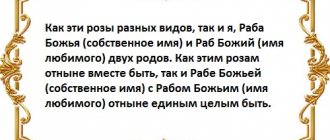How should we understand receiving the “gifts of the Spirit”?
In the church and theological environment, there are several versions of understanding the gift of tongues. According to the first, tongues are the ability to speak a foreign language granted by the Spirit. The need for this gift is determined by the fact that, according to the blessed one. Theophylact of Bulgaria, the apostles “had to disperse to all countries... one and the same person, at the inspiration of the Holy Spirit, began to speak Persian, and Roman, and Indian, and many other languages.” At the same time, the languages spoken by the apostles on St. Pentecost is described in Acts. 2, 4 with the word “others” (еτεραι), in the Gospel of Mark. 16, 17 speaks of “new” (καιναι) languages. Such grace-filled knowledge of foreign languages greatly contributed to the spread of the apostolic preaching throughout the universe and contributed to the unity of the Church of God. We find this understanding of the gift of tongues among the majority of saints. fathers. For example, at St. Cyril of Jerusalem we find the following judgment: “Peter and Andrew are Galileans and speak Persian and Median, John and the other apostles speak in every language with those who came from the pagans. The Holy Spirit teaches many languages together, which those who were taught by Him did not know at all.” In "Conversations on the Acts of the Apostles" St. John Chrysostom explains that “for the apostles themselves this served as reinforcement; they didn’t know what it meant to speak Parthian, but now they learned from these people.” Also St. Gregory the Theologian was inclined to understand the apostles speaking in “voices of foreign languages.” Understanding the “tongues” mentioned in 1 Cor. 14 as “foreign”, found in St. Theophan the Recluse.
Prayer for the family
I. Navin 24:15. I refuse to serve the gods my ancestors served. I destroy this sinful legacy over my life and affirm that I and my family serve the Lord. Ps. 1:3. And like a tree planted by streams of water, which bears its fruit in its season and whose leaf does not wither, I prosper in everything I do.
Ps. 111 Blessed am I who fears the Lord and deeply loves His commandments. My seed is strong in the earth, the race of the upright will be blessed. Abundance and riches are in my house, and His righteousness endures forever. We are good, merciful and righteous. We are good people and we lend, we give firmness to our lips in court. We will never be shaken, we are righteous. We are not afraid of evil rumors: our hearts are strong, trusting in the Lord. Our hearts are established: we will not be afraid when we look at our enemies. We have wasted, we have given to the poor, our righteousness endures forever, its horn will rise in glory. Small 4:6. The hearts of the fathers of my family turn to their children and the hearts of the children to their fathers. Acts 16:31. I believe in the Lord Jesus Christ, and I and all my family were saved.
Lord, I bless my entire family. May Your hand be with him. Pour out your Spirit and tell them your word. Let Thy wisdom enter into their hearts and ears, being attentive to godly counsel, so that they may do what is pleasing in Thy sight. Let the righteous multiply in my family, bless their work and families. Forgive all the lawlessness committed by my family, I want to see my family and friends repentant and saved. Do it, Father, in the name of Jesus Christ. May my entire family hear the voice of the Lord and accept Him! May the Lord bless my entire family and preserve it! May the Lord look upon my family with His bright face and have mercy on Him! May the Lord turn His face towards my entire family and give them peace! (Num. 6:24-26). If I am saved, my whole family will be saved, I serve, and my whole family serves God! Every knee of my kind bows before the Lord Jesus Christ, and their tongue confesses Jesus Christ as their Lord and Savior! He clothed my whole family with the garments of salvation, He clothed them with the robe of righteousness (Isa. 60:10). Their wives, children and grandchildren, their mothers and fathers, brothers and sisters will be saved from the evil way, from the man who speaks lies, from those who leave the straight paths to walk in the paths of darkness. These men and their families walk in good ways and keep in the paths of the righteous... (Prov. 2:12-14, 20-22). Discretion guards them, and understanding guards them to save them from the path of evil in the name of Jesus Christ. (Prov. 2:11-12). And they do not walk in the council of the wicked, they do not sit in the assembly of the wicked, but they sit in the assembly of the saints, and their will is in the law of the Lord, and on His law they meditate day and night, and they are like a tree planted by streams of water, which bears its fruit in time is yours. (Ps. 1). Not a single weapon made against me and my relatives will be successful; every tongue that competes with us in court - we accuse. (Isa. 54:17). Instead of ashes we receive ornaments, instead of mourning we receive the oil of joy, instead of a depressed spirit we receive glorious clothing, and we are called mighty in righteousness, the planting of the Lord for His glory. (Isa. 61:1-3). And the Lord wiped away every tear from our eyes, and there is no more death, no crying, no crying, no sickness in my family, for the former has passed and the Lord has delivered us from all troubles. (2 Samuel 22:3, Rev. 21:4). We can do everything through Jesus Christ who strengthens us!
The gift of tongues among the apostles and among modern charismatics: differences
At the same time, in the understanding of St. fathers, the gift of tongues had a historical (and not, as with modern charismatics, sometimes hysterical) and temporary significance. After the founding of national Churches by the apostles in different countries, the need for the supernatural gift of tongues disappeared as unnecessary. In the third century, during the life of Irenaeus of Lyons, the gift of tongues was mentioned extremely rarely. “We heard many brothers in the Church who had prophetic gifts and spoke in different tongues through the Spirit.” Precisely in the sense of understanding a foreign language. St. possessed this gift. Ephraim the Syrian, as well as a certain youth Armentarius, who spoke foreign languages without learning them, as St. Gregory Dvoeslov in his interviews about the life of the Italian fathers. Saint John Chrysostom admitted that such “signs” have already been abolished: “So, we have not lost anything, if we only want to be attentive. We receive the main benefits in Baptism: remission of sins, sanctification, communion of the Spirit, adoption, Eternal life. What else do you want? Signs? But they were abolished. You have faith, hope, love that endures; look for them; they are greater than signs.” It is obvious that here the saint is talking about the fulfillment of the prediction of St. Paul on the abolition of the gift of tongues: “tongues will be silent” (1 Cor. 13:8). The bluzh had exactly the same position in the West. Augustine: “In early times the Holy Spirit was poured out on believers, and they spoke in tongues that they had not learned, for the Spirit gave them the gift of speech. These were signs timed to time. Because it was fitting that this sign of the Holy Spirit should appear in all languages, to testify that the Lord's Gospel would be preached in all languages and to all the ends of the earth. It was done for a sign, and it passed away. Do we now expect those on whom hands are laid to speak in tongues? Or when we laid our hands on these children, did any of us expect them to speak in tongues? And having seen that they did not speak in tongues, has any of us been so depraved in our hearts as to say, “They have not received the Holy Spirit”?” Saint Ignatius (Brianchaninov), quoting the words of St. John Chrysostom, also shows the lack of need for such signs as the gift of tongues for Christians of recent centuries: “So, I do not need signs. Why is this? Because I learned to believe in the grace of God even without signs. The unbeliever needs proof; but I, a believer, do not need any proof or sign; although I do not speak foreign languages, I know that I am cleansed from sin.”
Prayer for health
Exodus 15:26 The Lord is a healer of me and my relatives.
Exodus 23:25. We serve the Lord our God, and He blesses our bread and our water, and turns away illnesses from us.
Ps.29:3 Lord, my God! I cried out to You and You healed me...
Ps102:2, Bless the Lord, my soul, and do not forget all His benefits.
Psalm 106:20. He sent His word and healed us and delivered us from our graves.
Psalm 117:17. We will not die, but we will live and proclaim the works of the Lord.
Ps.146:3 He heals the brokenhearted in my family and heals their sorrows. Proverbs 4:20-22. I listen to the words of God, and I incline my ear to His words, so that they do not depart from my eyes, I keep them inside my heart, because they are life for me, and health for my whole body.
Exodus 19:22. I turn to the Lord, and He hears me and heals me. Exodus 38:16, and gives me life.
Ex.53:4-5. He took upon Himself my infirmities and bore my illnesses... He was declared for my sins and tormented for my iniquities, the punishment of our peace was upon Him, and by His stripes I was healed Ex.58:8. My light is revealed like the dawn, and my healing has increased, and my righteousness goes before me, and the glory of the Lord follows me. Luke 6:19, power comes from Him and heals me. And based on Luke 9:11 Lord, I receive by faith, complete healing from all my ailments in the name of Jesus Christ. James 5:15-16. And through the prayer of faith the Lord healed and raised me up, and forgave me the sins I had committed. We confess our wrongdoings to each other and pray for each other to be healed: the fervent prayer of the righteous can accomplish much! 1 Pet.2:24. He Himself bore my sins in His Body on the tree, so that I, having been delivered from sins, might live for righteousness: by His stripes I was healed Gal.3:13. Christ redeemed me and my family from the curse of the law, becoming a curse for us. Rom.12:1, 1 Cor.6:19. I present my body to God, since it is the temple of the Holy Spirit, who lives in me. I do not belong to myself, I was bought at a price. In the name of Jesus Christ, I renounce all excess. My body, in the name of Jesus Christ, be still and submit to the Word of God. I mortify the carnal desires of my body and command it to come into conformity with the Word of God.
I triumph and accept the victory given to me by Christ, declaring that by the Wounds of Jesus I am healed spiritually, mentally, emotionally, physically. I am free in Christ. Thank you Father.
“Corinthian glossolalia” or a miraculous gift?
When discussing the phenomenon of the gift of tongues, it should be recognized that even Orthodox authors often distinguish the miraculous gift mentioned in the Book of the Acts of the Apostles from the so-called. “Corinthian glossolalia”, which, according to Bishop Cassian (Bezobrazov), “did not allow identification with any historical language” and can be correlated with “ecstatic speech, which is observed in a state of strong religious excitement...”. On the one hand, this could be a consequence of the mishandling of the gift of tongues in the Corinthian Church, where many Christians had the gift of tongues for the sake of the many foreigners who visited this large trading city. However, the Corinthians were very proud of the gift of tongues, and therefore used it not only for preaching among the pagans, but also directly at divine services, when there was no need for it. Ap. Paul, warning against such abuse and “foolish pursuit,” explains that the gift of tongues “is not for those who believe, but for those who do not believe”—to attract them to faith. Therefore, the main point of the fourteenth chapter of the Epistle is not to affirm the importance and usefulness of glossolalia in itself, but to prohibit the Corinthians from speaking in other tongues at prayer meetings. There is also an opinion that in the Corinthian Church, divided by schism, glossolalia could degenerate as a phenomenon, turning into the gift of speaking languages that were incomprehensible not only to others, but also to the owner of the gift, which caused temptation (1 Cor. 14:23) and required interpretation ( 1 Cor. 12:10; 14:26). Thus, there is no direct evidence that “Corinthian glossolalia” had its own independent and positive meaning as a “new prayer language” without any connection with the need to preach in this language among the pagans. Even if A.P. Lopukhin, M. Skaballanovich and some Orthodox researchers admit that in Corinth the gift of tongues manifested itself as “the eruption of a deep inner feeling, not clearly recognized by the speaker himself... [who] could not express his feelings in a coherent and consistent speech” , however, this assumption is very vague and does not have a clear positive response in the works of the Holy Fathers and teachers of the Church, who, on the contrary, strongly warn against any enthusiasm in prayer and recommend doing “smart prayer.” Even if such a fact took place in the practice of the Corinthian community in apostolic times, it should be perceived as an anomaly, and not as a description of one of the forms of a prayerful state. Already the ap. Paul urged the Corinthians to approach what was happening in their meetings with reason (1 Cor. 14:29), “so that nothing demonic might creep in under the guise of prophecy. This purpose was served by the special gift of “discernment of spirits” (1 Cop. 12:10): whether this is said by the action of the Spirit of God. Ap himself. Paul warned the Corinthians about the danger of accepting pseudo-gifts of grace (2 Cor. 11:4), as did the apostle. John called for “testing the spirits to see whether they are from God, because many false prophets have gone out into the world” (1 John 4:1). Similar advice was preserved in the Didachi, which calls for distinguishing a prophet from a false prophet. Here the state of the prophet in the “spirit” can be understood as his being outside himself, when, by inspiration from above, a ministering spirit, good or evil, sent or allowed by God for a specific task, speaks through the prophet. Thus, already in the Ancient Church there was a very wary attitude towards religious delights and “gifts of grace.” In the 2nd century, the prophecies and “frenzied speeches” of the Montanists were directly classified as demonic possession.
Baptists
The Baptist movement first appeared in England in 1633. Almost immediately his followers moved to North America. Baptists united representatives of various Christian denominations. They have a common opinion that the rite of Baptism should be performed only for adults professing faith. This ritual of theirs is known as credoptism.
It is contrasted with infant baptism, which is common among Catholics and Orthodox Christians if at least one of the parents is a Christian. Most Baptists belong to various Christian branches, especially Protestants. They believe that true baptism must occur with complete immersion in water. This distinguishes Baptists from other movements, where to perform the rite of baptism it is enough to pour or sprinkle only the head with water.
Baptists believe that it is necessary to completely immerse a person in water at baptism so that he becomes part of the death, burial and resurrection of Jesus Christ the Savior. The founder of this movement in Christianity was a pastor from Britain, John Smith. He was distinguished by his reformist views.
Baptists are very hostile to Orthodoxy, denying infant baptism. In their opinion, newborn Christians are already washed and cleansed by the Blood of Christ. Therefore, they believe that there is no need to baptize small children - they do not have the sins that God forgave them at birth. Baptists point out that early Christians baptized only adults. Their leaders do not consider any Church capable of establishing a connection with God.
Sacraments of the Church against mumbling in ecstasy: pros - cons
Glossolalia (i.e., slurring) was never considered a normative experience of grace in the early Christian Church. On the contrary, linguistics itself is seen as “the result of nervous excitement, falling into a trance and hallucination bordering on madness.” The search by Christians for delight and ecstasy in prayer, as ascetics and devotees of the Church teach, is a sign of a passionate and proud spiritual direction. Charismatics replace the genuine gifts of the Holy Spirit with artificially caused emotional experiences. Ignoring the spiritual experience accumulated by Christianity over two thousand years and recorded in the works of the saints, rejecting the divinely established priesthood and the holy Sacraments, modern charismatics are trying to induce a state of grace in themselves by all sorts of dubious and dangerous methods. The result is self-deception or “delusion,” which the Holy Fathers of the Orthodox Church warn against. Such states of ecstasy have nothing to do with Christianity; they were known to the ancient pagans, and they are also known to modern Hindus and shamans. An Orthodox Christian must in every possible way avoid such perversions of religious feeling. He has access to genuine treasures of grace in the Sacraments of the Church, in her divine services and in his private, sincere prayer. In communication with God, one must look not for delight and acute experiences, but for the renewal of one’s sinful soul. Renewal comes through humility, repentance and self-correction. And think for yourself, why do the overseas charismatics who come to us require translators, if the gift of glossolalia should logically exempt them from this? Yes, only because the apostles, according to the Acts of the Holy Apostles (Acts chapter 2), did not master glossolalia, but xenoglossy - their language was understood by those around them, since it had a semantic connotation! This is not meaningless muttering or forced innervation of the tongue in the process of automatic speaking, called the syndrome of mental automatism, which was described by the Russian psychiatrist V.H. Kandinsky in 1885.
“Speaking in different languages,” shamanism and simple deception
Analysis of the mechanism of occurrence of such a state shows that it does not at all arise spontaneously or arbitrarily, but can be completely organized, deliberately caused with the help of professionally performed techniques. Such frequently used techniques include: concentrated group prayer, the incessant repetition of one phrase (a kind of individual or collective “mantra”), the deliberate muttering of inarticulate and meaningless syllables that serve as a “master key” to the mysterious area where “speaking in tongues” occurs. They represent an arsenal of psychological and physiological techniques close to the shamanic practice of immersion in trance. Orthodox theologians insist on the non-Christian nature of the practice of the charismatic movement precisely because it lacks the practice of repentance and confession of one’s sins, but pride, a sense of self-sufficiency, and self-satisfaction are powerfully manifested.
Research by Psychiatrists
Both domestic and foreign psychiatrists who have studied these mental phenomena consider the main component of it to be feelings of external influence, the external influence of an outside force. Unfortunately, all these very respectable psychiatrists (V.Kh. Kandinsky, A.L. Epstein, A.A. Perelman, A.V. Snezhnevsky, M.I. Rybalsky), due to the vulgar materialism dominant in their worldview, were looking for the cause the indicated phenomenon in man himself, without being able to understand that it lies in the ability of intelligent beings of a parallel ultra-subtle world of a non-protein-nucleic nature (demons) to influence the consciousness and central nervous system of a person. But the researcher of the phenomenon of glossolalia, Felicitas D. Goodman, author of the book “Speaking in Tongues: An Intercultural Study of Glossolalia,” provides data on the result of a comparative study of the phenomenon as it is practiced among Pentecostals in the USA and Mexico, among the pagans of Borneo, Indonesia and Africa. He talks about it this way: “I define glossolalia as the order of vocalization, the pathomatism of speech, which is produced in the subconscious state of trance and is directly reflected in its partial and super-partial structures, in the neurophysiological processes that are present in this altered state. Simply put, something that happens in the nervous system during the trance state causes speech to break up into phrases of the same length, if we take into account the pauses... I believe that the trance state is the cause of the obsessive intonation in glossolalia: without ever changing, it rises to peak at the end of the first third of a separate part of speech and, approaching the end, falls to a level much lower than the original one,” writes N.V. Porublev in his book “The Phenomenon of Glossolalia” (Publishing house Australia, 1995, p. 21). To be continued. Literature: Theophylact, blessed. Interpretation of the Acts of the Holy Apostles. — M.: Ark. T.2. P. 76. Lopukhin’s Explanatory Bible. T. 10. P. 14. John Chrysostom, St. Selected creations. Conversations on the Acts of the Apostles. - M.: Publishing house. dept. Moscow Patriarchate, 1994. Feofan (Recluse). Interpretation of the Epistles of St. Apostle Paul. - M.: Rule of Faith, 2005. P. 197. I. Lyonsky, St. Creations. M.: Pilgrim. 1996. P. 456. Augustine, blessed. Sermons on John VI, 10. Quoted. by: Seraphim Rose, Hierom. Orthodoxy and the religion of the future. - Kyiv: Publishing house. them. St. Leo. P. 138. Ignatius (Brianchaninov), St. About signs and wonders. Jordanville, I960, p. 30. Cassian (Bezobrazov), St. Christ and the first Christian generation..., P. 269. Lopukhin A.P. Explanatory Bible. T.N. - Stockholm: Institute of Bible Translation, 1987. P. 107. Alexander Usatov, priest. Mimicry of Orthodoxy among neo-charismatics and modern renovationists. - M., 2007. P. 115. Interpretation of the Epistles of St. Apostle Paul. M.: Russian Chronograph, 2002. P. 200. Zavershinsky Georgy, priest. The spirit breathes where it wants. Introduction to the Orthodox doctrine of the Holy Spirit. - St. Petersburg: Aletheya, 2003. P. 35. Solodkov A.I. Analytical study of internal documents of the “New Generation” sect. Russian Orthodox University. 2002, p. 270.
Characteristics of Charismatics
The charismatic movement may be “a sure indicator of a new worldview associated with the massive spread of the ability to have an amazing experience, which is called the “baptism of the Holy Spirit,” accompanied by the ability to heal, speak in tongues, prophecy, and enter “other” spheres of consciousness. The majority of the essence of what is happening is not realized, not reflected, the experiences of “baptism” are so strong in themselves, so carefully psychologically pre-prepared by the leaders, that the participants have practically no doubt that the Spirit of God has descended on them, that they have truly been awarded God’s Gifts . The psychological atmosphere of the movement is so tense and specific that the very question of its specificity or source is perceived as blasphemy, sacrilege, blasphemy against God himself. A characteristic feature of the charismatic movement is its fragmentation, but behind the diversity and diversity of cult practice, the inconsistency of dogmatic attitudes, almost fair-sale, inviting names (“Assembly of God”, “Church of God”, associations of “Pentecost” and “Holiness”, groups of “Full Covenant”, organizations “Fire of Awakening”, “Chapel on the Stone”, “Calvary”, “New Generation”, “Embassy of God”, etc.) there is a fundamental unifying basis that determines ecumenical endeavors. This basis is new human abilities discovered during liturgical practice, identified paranormal potencies
Healing and spiritualism
But the same patterns can be found in a healing session among Pentecostals. The American doctor “Kashpirovsky” - Orwell Roberts, with the help of a real “magic circle” of people who were in a sympathetic mood, creating harmony and putting their hands on the TV during his programs, produced “miraculous healings” that were successful even if the patients only drank a glass of water standing on the TV (paying, however, later for it with mental and physical disorders). All the requirements necessary for a spiritualistic session are fulfilled in the liturgical practice of charismatics: 1. Passivity takes such hold of some communities that they completely abandon the church organization and any routine of worship, and in everything they absolutely obey the instructions of the “spirit.” 2. Community of faith presupposes a special attitude of expectation of “charismatic” phenomena of all those present. The “Baptism of the Holy Spirit” is usually carried out in a small room, with a small number of participants already familiar with similar experiences. The presence of at least one person who has a negative attitude towards the procedure is enough to prevent “baptism” from happening. Even one person can disrupt the mutual induction process. 3. The spiritualist “magic circle” corresponds to the “laying on of hands” among Pentecostals, which is performed only by those who have already been “baptized” and experienced the state of “speaking” in tongues. Among spiritualists they correspond to mediums. 4. “Charismatic”, like “spiritual” atmosphere is created with the help of suggestive hymns and prayers, clapping hands, dancing, creating the effect of increasing excitement, similar to intoxication, preparing the transition to a trance. Very reminiscent of the Khlyst “zeal” on their “ships”. It can be said with complete certainty that the charismatic movements have discovered a whole set of mediumistic techniques that help to enter and remain in such a psychological state when “miraculous gifts” become habitual. In other words, the “laying on of hands”, which is a condition for achieving the state of “speaking in tongues,” is the transfer of the mediumistic gift by those who have already received it and have become a medium themselves. Baptism with the “Holy Spirit” is a mediumistic initiation, a kind of initiation of an adept into the occult world. The charismatic revival merges with the occult movement and Eastern religions, which marks the triumph of paganism. Pentecostalism, the most striking form of “possession by spirits,” as we mentioned, arose on the outskirts of sectarian Christianity as a result of a religious experiment; it legitimized among Christians the “prestigious experiences” of cheap and easy initiation - without repentance, without awareness of one’s own sinfulness. At the dawn of its youth, Christianity prohibited contacts with the occult kingdom, considering it the kingdom of demons, demons, and lower powers. The call of these forces of St. Ignatius (Brianchaninov) called delusion, spiritual lust, temptation. Their psychological equivalent is spiritual complacency, complacency, and passivity. To be continued. Literature: Andrey Kuraev, deacon. Protestants about Orthodoxy. – M., 1997. P. 46. Narizhny Yu.A. Neoreligions as a sociocultural phenomenon. – Dnepropetrovsk, 2004 P. 66. Meeting with the unknown. Supernatural world and reality. – Kyiv, 1994, p. 178.
The connection between the practices of charismatics and mediums
A more careful analysis shows that the practice of charismatics coincides with the practice of mediums (the ability to clairvoyance, hypnotism, “miraculous” healing and other paranormal abilities). Mediumship healing can be learned and trained, it is associated with a certain system of techniques. They can be obtained by inheritance or through contact with someone who has such abilities, even through reading special occult literature. Many mediums claim that their gift is not connected with the realm of the supernatural, but comes from that area of the natural, which is practically unknown. Orthodox theologians insist that mediums turn to the sphere of “fallen spirits”, that God has forbidden man to communicate with occult areas (Deut. 18:10-12. Also Leviticus 20:6). Contact with occult phenomena has nothing to do with the Christian desire for the salvation of the soul.
Instructions for communicating with Pentecostals
History of Pentecostalism
The history of the Pentecostal movement is well known today. Its main milestones are as follows. At the end of the 19th century. In the city of Topeka (Kansas), the Methodist preacher Charles Parham, who led the local Bible school, was famous. He gave the school students the task in his absence to find signs of true spiritual baptism in the New Testament. They came to the conclusion that the evidence of the baptism of the Holy Spirit is speaking in tongues (Acts 2:4), a miracle that first occurred on the 50th day after Easter, at the moment of the descent of the Holy Spirit on the apostles (hence the name of this church). After some time, 18-year-old student of this school, Agnes Ozmen, received spiritual baptism based on the research of the students of the Bible school. On January 1, 1901, at 11 o’clock in the evening, she, “at the prompting of her heart,” asked to have hands laid on her in order to receive the baptism of the Holy Spirit. After this, she began to speak in new tongues and praise the Lord, claiming that streams of living water flowed from her insides. Then most of the Bible school students began to speak in tongues. Within five years, Parham had amassed at least 25,000 followers.
A new impetus to this movement was brought by one of Parham’s students, the black preacher William Seymore. Seymour, citing Acts. 2, 4, preached the baptism of the Spirit. On April 9, 1906, Pentecostals claim a fire broke out in a prayer meeting on Bonnie Brae Street. An eight-year-old boy was the first to receive spiritual baptism, followed by many others. Seymour rented the Methodist Church at 312 Azusa Street, which is the true beginning of the worldwide spread of Pentecostalism. For three years, prayer meetings took place here continuously. According to Pentecostal eyewitnesses, everything was in an idyllic spirit: demons came out, the sick were healed, many received salvation, returned to the Lord and received the baptism of the “Holy Spirit.” The description of these meetings is generally done in the style of a “resurrected utopia.” Allegedly, the ancient apostolic church was revived at these services. However, any newly formed Christian sect always describes its own emergence in similar tones: as the arrival of a long-awaited light after many centuries of darkness.
The Pentecostal message was brought to Europe by Thomas Barratt, a Norwegian Methodist. He became acquainted with the movement in New York and prayed for a Pentecostal experience. Praying 12 hours a day, on December 7, 1906, he received spiritual baptism. Witnesses said that a supernatural light appeared above his head. According to him, his whole being burned as if on fire, while he quietly sang in a language unfamiliar to him. Since then, Pentecostalism has successfully spread throughout Europe.
In the 60s of the 20th century, what is now called the “charismatic movement” emerged. If the former Pentecostalism was rather “post-Methodism with glossolalia” (the founder of this movement was a Methodist pastor, and it was from Wesley’s Methodism that Pentecostalism borrowed the doctrine of sanctification, according to which, without much asceticism, one can quickly achieve Christian perfection and almost deification), then charismatics bring “ the spirit of modernity" - more variety shows, more modern music, more special effects, more emphasis on the "force field" - demons are cast out by the thousands without any special effort on the part of the charismatic "exorcist". Meetings of “traditional” Pentecostals were more reminiscent of Baptist ones (albeit with “speaking in tongues”), while charismatic meetings are more reminiscent of the atmosphere of a rock concert in its most “heated” version: there are falls on the floor, and “spiritual dancing” and “holy laughter”, and cries reminiscent of animal cries, and simply convulsive movements - in general, the whole set of “charismatic phenomena”. Only visitors to rock concerts, of course, will not say that these are manifestations of the divine, but charismatics, on the contrary, are convinced that in all these phenomena there is “direct communication” with God. Considering such a clear external difference between charismatics and the “old” Pentecostals, and, in addition, some of their “zigzags” in dogmatic issues, many observers decided that these were “not quite Pentecostals” and began to call them “neo-Pentecostals.” However, in our opinion, this does not have sufficient grounds. Rather, it can be argued that charismaticism is “Pentecostalism of the postmodern era,” which has absorbed the spirit of modernity much more consistently than the old-style Pentecostals. After all, modern Russian baptism, with its cheerful pop songs of “youth meetings”, believing that salvation can be lost, is not like the old baptism of the 18th century, where hyper-Calvinism and a stern Puritan spirit clearly prevailed. However, this is not a reason to talk about “neo-Baptism.” Catholicism after the Second Vatican Council also changed noticeably, but we still do not speak in the strict sense of the word about “neo-Catholicism,” realizing that we are talking about continuity.
As for dogmatic issues, it must be borne in mind that Pentecostalism, like other radical Protestant groups, has always had a vague dogmatic consciousness. In this regard, quite quickly Pentecostalism was divided into many groups and denominations, the doctrines of which were far from identical. For example, there has long been a group of “Oneness” Pentecostals who deny belief in the Trinity. However, this does not prevent them from speaking in tongues like other Pentecostals, and from experiencing many of the charismatic “phenomena” that are also observed in more “orthodox” groups - of course, Pentecostal groups who recognize the Trinity will say that glossolalia “ Oneness" is not from God, but it is very difficult to find differences between the charismatic phenomena of "Oneness" and other Pentecostals even with detailed research - the “fruits” here are so similar. Let us not forget that charisma is present not only within the framework of Pentecostalism, but is capturing increasingly large areas in the rest of the Christian world - there are “Bapto-charismatics,” Catholic charismatics, and even individual Orthodox parishes that promote the “charismatic style.” This once again proves that charismaticism is dogmatically omnivorous to a certain extent, and the emphasis is not on strict doctrinal doctrines, but on the experience of the corresponding “phenomena” - here the now fashionable ecumenical spirit is clearly manifested. This is precisely why it attracts the “mass of the population”, being the fastest growing Christian denomination in the world. By the way, some charismatic phenomena were already observed during Seymour’s meetings on Azusa Street, at the beginning of the 20th century - people laughed hysterically, sobbed, shook, and made uncontrollable movements. So the charismatics inherited the spirit - only the special effects changed. We should not forget that the old Pentecostalism is increasingly disappearing, giving way to charisma. It is obvious here that the future of Pentecostalism is connected precisely with the “power actions” of charismatics, which are able to attract the younger generation much more effectively than the old Pentecostalism. In addition, even in “traditional” Pentecostal communities, the literature of “charismatic stars”—Hinn, Copeland, Hagin—is sold. Therefore, the gradual merging of “tradition” and “innovation” is apparently a matter of time.
If we talk about the history of Pentecostalism in our country, the first Pentecostal missionaries appeared in Russia in 1911, when the American missionary Urshan came to Vyborg, where he created the first community. Already in 1914, the Pentecostal mission was in Transcaucasia. People converted to Pentecostalism from such Protestant movements as Baptists, Evangelical Christians (of these groups, some communities went to Pentecostals almost in full force), Molokans, etc., but also from Orthodoxy. However, the largest part of Russian Pentecostals and CIS countries originates from the preaching of I.E. Voronaev, who came to Ukraine in August 1921 and preached “divine consolation” there. The successes of his mission were very great and in 1927 the “Union of Christians of the Evangelical Faith” numbered over 350 communities with a population of more than 17 thousand people. Let us note that the reputation of Pentecostal missionaries even then left much to be desired. For example, preachers of Pentecostalism, coming to Baptist communities, pretended to be Baptists or Evangelical Christians (these confessions existed separately at that time), having in their hands the certificates of preachers signed by the leaders of these confessions (in particular I.S. Prokhanov - the head of Russian Evangelical Christians), whom they apparently also misled. The above-mentioned I.E. Voronaev also did not shine with holiness. It turned out that Voronaev was a preacher in San Francisco, but was expelled for deception. He found like-minded people and together with them wrote, as if on behalf of the community, a petition to the American Committee, asking the committee to ordain Voronaev as a presbyter. The deception was discovered and Voronaev was expelled - thus both the American Pentecostals and their Russian co-religionists were deceived.
It is interesting that Pentecostalism, which appeared in Russia at that time, was compared by both Orthodox and Baptists to the Khlysty sect and called “shakers.” Of course, the Khlysty were not Protestants - they denied that Christ was God, that He was resurrected, they recognized the transmigration of souls, etc. As in some other Russian sects, the Khlysty had people who identified themselves with Christ, and in this case this stemmed from their creed, which recognized that God can be incarnated in a person many times, so there were sectarians in whom it was believed that God the Father, Son of God, Holy Spirit. In this regard, the sectarians in whom the Son of God was incarnate were considered “Christs” (hence, perhaps, the name of the sect). The feeling of similarity with Pentecostalism was caused by the fact that, according to the Khlysty, the Holy Spirit imparts gifts to them: someone is given the gift of prophecy, someone is given the gift of healing, someone is given the gift of tongues, etc. During their meetings (zeal), they circled and ran, citing the example of the prophet David, who galloped in front of the ark. This happened in different ways: for example, a circle was formed, each member of which jumped to the beat, waving their arms, or they ran after each other from the front to the back wall. All this was done to attract the grace of the Holy Spirit. And then the “holy spirit” descended. The descriptions of these events are very interesting. For example, it was noted that during Khlyst meetings, convulsive crying, sobbing, laughter, screaming, hiccups, falling to the ground, beating the head on the floor, and various forms of convulsions were often observed. Some people became “clairvoyants” and “miracle workers.”
As we see, the descriptions of Khlysty meetings and their “effects” are very reminiscent of charismatic “phenomena.” Even though the Khlysty had a different dogma, they knew a lot about the “charismatic spirit” - this can serve as the best argument in favor of the fact that Pentecostalism is not built on clear doctrinal formulas, such as the confessions of classical Protestantism. There is only one formula here: every “true Christian” must experience communication with God in the form of a certain set of visible miracles - speaking in tongues, etc. Those who do not have such experiences are enrolled in the department of “old, outdated” Christianity. When Pentecostals found themselves in Russia, they immediately included not only Orthodoxy, but also Baptism as such an obsolete Christianity, even though the latter was much closer to it in spirit. Be that as it may, at the end of the 20s, the godless authorities, who had previously been very favorable to the “sectarians,” began to persecute Pentecostals as well. And in 1945 As a result of the violent intervention of the communist authorities, most of the Pentecostals were united with the Baptists. It is characteristic that the Pentecostals promised not to speak in tongues publicly, at general meetings, but only during home prayer - i.e. in fact, they were ready to abandon the main point of their creed to please the godless regime! Of course, there were also Pentecostals who did not join this “disgrace” - but this was persecuted by the Soviet authorities as dangerous sectarianism. Finally, in 1991, during a time of general disunity, Baptists and Pentecostals also separated. The last 20 years of the existence of Pentecostalism in Russia are characterized by a fairly rapid growth in the popularity of this confession, especially the “charismatic” direction.
Controversy with Pentecostalism
A person who encounters Pentecostalism for the first time immediately senses its strong difference even from such a typical manifestation of American evangelicalism as Baptistism. The abundance of charismatic phenomena, even if not observed “live”, will create a strong impression, and the impression is often repulsive. It seems that this simply “cannot be” Christianity - it defies the logic of “common sense” so much. But a researcher of Pentecostalism must understand: the logic of common sense here often has to be forgotten. This, if you like, is the first point of polemics with Pentecostalism: rational arguments, for example, quotations from the Holy Scriptures, are even less effective in this case than in discussions with Baptists or Adventists. And this is obvious, since Pentecostals place much more emphasis on the irrational (charismatic) than other neo-Protestant groups. Of course, we must not forget that logical argumentation is not given first place in theological disputes: a believer is inclined to “vote with his heart,” and when hearts “beat differently,” then the appeal to logic loses its power. On the other hand, this cannot be a reason to completely forget logic: knowledge of Scripture and Orthodox theology, as well as Pentecostal doctrines, is still assumed. You just need to always remember that the best argument for non-Orthodox people in defense of Orthodoxy would be our life in Christ.
Biblical quotations by themselves do not have the necessary degree of persuasiveness. The Bible does not say in black and white: Pentecostalism is evil and heresy. Yes, it is said that “tongues will be silent,” but it is not said exactly in what year. The Orthodox could say that the gift of tongues was given to the Church for its strengthening in the initial, apostolic period - so that the Christian message would quickly spread in the languages of those peoples who were to be baptized “in the name of the Father, and the Son, and the Holy Spirit” (Matthew 28, 19). However, nowhere do we see glossolalia or charismatic phenomena being considered the cornerstone of the Church and the first sign of a true Christian. The church has always found its strength in the grace of God, not in “speaking in tongues” per se. However, such argumentation presses on the historical logic of Christian theology, and Pentecostals, like other neo-Protestant groups, are quite indifferent to the history of Christianity: they do not really care that such an understanding of Christianity did not exist for almost 19 centuries, and that even the leaders of the Reformation had it to others. This is completely sectarian logic: everything was wrong before us, and we were the first to discover the truth and “revive” Christianity. The joy of such “Colombians” will not be stopped by references to the history of the Church, because these people are convinced that there was simply no Church before them, and Pentecostalism appeared practically “out of nothing.” You will quote the Bible and the Fathers of the Church, proving that Christians never knew anything about any “holy laughter”, that we do not read anywhere that the apostles at their meetings did nothing but bang their heads on the floor and make screams like the cries of animals . But WHAT are these arguments for a person who constantly FEELS such a “tide of grace” in this laughter, screams and other “miracles” that you have never even dreamed of?
Here it is quite appropriate to draw an analogy with drug addiction: you offer the drug addict some reasonable arguments proving that drug addiction is evil and leads to personality degradation; and he, accustomed to experiencing a thrill every day, will only laugh at you. From Pentecostals you can periodically hear words like “if only you knew how GOOD it is.” It is this “GOOD” that many arguments appealing to reason and conscience break down. You can prove for a very long time and methodically that a Christ “dancing” and “running across the stage,” as charismatic preachers do, is impossible. But for Pentecostals, the dancing and antics of preachers and their flocks are a completely legitimate way of communicating with God. You can strongly argue that pop songs and primitive couplets of charismatics are tasteless and anti-cultural, but for them this is the best and almost the only way to feel God and His gifts: so for you it is bad taste, but for them it is just a different taste - in the person of the charismatic movement we have such a confession when the mass culture of the 20-21st centuries. with all its non-Christian “twists” became Christianity, and Christianity became mass culture.
For an outside researcher, the question here is how, in principle, Pentecostals understand God and communication with Him: do they not call a completely different reality by the name of “Jesus” or “Holy Spirit”? Are they advertising God in the manner of another market dud? References to the fact that there is a rich Christian culture with Byzantine hymns, Gregorian chant or the melodies of Bach do not help the situation here at all - just under the Znamenny chant or organ chorales, it would be difficult for a Pentecostal to come into an ecstatic state and feel “all the delights” of charisma. They are simply bored by culture, just as fans of pop music would be bored at a concert of classical or sacred music. Generally speaking, familiarity with the Pentecostal world gives rise to the inevitable thought that any traditional Christian culture (Orthodox, Catholic or Protestant) is an obstacle to the fullness of charismatic sensations. This is the historical and cultural nihilism that is in no small part inherent in the charismatic movement. Oh yes, we all understand that Christ is above any cultural forms, and we need to worship Him, not culture. However, Christianity has always been embodied in a certain culture - this was the communion with Christ of a given people in history. Using the example of Pentecostalism, we see the alienness of their understanding of Christianity to any culture, for this is a “disembodied” Christianity; if it can be embodied, it can only be in pop culture. Those. instead of Byzantine, Gothic or Baroque Christianity, you are offered not Christ Himself, but an “instant” version of Christianity, reduced to the level of the average consumer society.
The point is that Pentecostal communication with God involves “turning off control” from the mind and heart, which allows you to experience ecstasy to the “ultimate depths.” It is not for nothing that Pentecostals often talk about a supernatural force that defeats them outright, and they understand union with God as “violence from above.” In this sense, the Orthodox liturgy can only interfere with charismatic “enjoyment,” for it presupposes a person’s conscious and deep participation in communion with God, reminding this person of how dirty his heart is and how clouded his mind is. In Pentecostalism we encounter the exact opposite approach: you are constantly reminded that you are holy, and in no case should you consider yourself a sinner - someone who considers himself a sinner, according to charismatics, will never find salvation. As if the Apostle Paul did not speak of himself as the chief of sinners. But among charismatics we encounter downright magical thinking: if you think that you are holy, then you are actually holy; if you think you are miraculously healed, then you are miraculously healed; if you are not healed, it is simply because you did not “confess” the healing enough. The fact that the Lord God is independent of our faith and may not heal us simply because it pleases Him is not taken into account here.
And in this case we are faced with another characteristic feature of Pentecostalism: their miracles are often of a very rational nature, for example, glossolalia. It is far from so sudden - there are whole instructions on how to speak in tongues: it is advisable not to speak words in your native language, to breathe as deeply as possible (as the famous charismatic Hagin advises, but we will not find such instructions in the New Testament), or to pronounce some repetitive, meaningless sounds (la-la-la, etc.). Those. first you need to prepare yourself for a “miracle”, and only then the “miracle” will happen. Orthodox literature describes many cases when the Jesus Prayer turned out to be too obvious an obstacle to “speaking in tongues” - for some reason, prayer to Christ destroyed glossolalia - apparently, these “gifts” are afraid of the Name of the Savior? Pentecostals have an amazing belief that if we ask God for something (for example, the gift of tongues), He will definitely give it to us - but it does not occur to us that our requests may be contrary to His will, and, moreover, , a person’s relationship with God is not magical: not always what we want is given to us by God - “not my will, but yours be done” (Luke 22:42). Critics of Pentecostalism point out that speaking in tongues was also found in paganism, and today, even if we do not draw parallels with paganism, the very meaning of such glossolalia is not clear. It is clear that this is not a supernatural gift of foreign languages: American missionaries in Russia and Ukraine cannot contact local co-religionists even in broken Russian. But even those missionaries who (like Adelaji) remained in the “Russian world” to preach still speak Russian with a fair accent.
Traditionally it was believed that the apostles were given the gift of knowledge of foreign languages to convert other peoples to Christ. However, we do not see Pentecostals so actively converting non-Christian peoples to Christ. Basically, they are engaged in taking away part of the flock from traditional Christian confessions. Pentecostals claim that it has been proven that their leaders spoke Hebrew and Chinese. Let's assume that this is true - well, where are the millions of Jews and Chinese who converted to Christianity? References to the fact that “coming out of ecstasy” charismatic preachers “forgot” foreign languages proves only one thing: you, gentlemen, have some strange gifts - for some reason they appear only in an unconscious state, and as soon as a person is in a state control themselves - they disappear without converting anyone to Christ; There are no miracles for the sake of miracles - they are intended for our salvation. Not to mention the fact that very often glossolalia is simply a set of incoherent sounds that have never been identified with any human language - attempts by Pentecostals to convince the whole world that these inarticulate mutterings are the “language of angels” cause everyone to laugh. In the same way, attempts to prove that Pentecostals have the gift of “recognizing tongues” constantly fail. In this regard, they were often caught in obvious lies - in particular, Father Oleg Stenyaev personally exposed the falsity of the claims of some Pentecostals to an allegedly “miraculous” knowledge of Hebrew.
Most Christians are alarmed by Pentecostalism's focus on the “unconscious” and “ecstatic,” which evokes analogies with paganism rather than Christianity. However, among Pentecostal-charismatics everything is subordinated to this - fast pop music, frequent repetition of the same lines, hysterical shouting and running of preachers, as well as their generally inappropriate antics (for example, the sermons of the famous pastor Shapovalov with his carefully programmed “madness” , or Pastor Ledyaev’s sermons on the toilet) - all this is intended to pull the rug out from under the “feet of reason.” You often come to the conclusion that the more inappropriately a given charismatic preacher behaves, and the more “frantic” the style of a given meeting, the faster the public comes into ecstasy and enjoys the “gifts”: here they think not about their sinfulness and unworthiness, but, in contrast to this , quickly strive for “delightful experiences,” and therefore the main goal of the pastor is to “get” his flock faster. We will not find such “models” either in the preaching of Christ and the apostles, or in the preaching of Christians of the following centuries, but in Pentecostalism it is apparently impossible to do otherwise. Here they pretend to kill the mind and heart, and then grace supposedly will flow in full flow. In the Bible we see that, on the contrary, God prefers to communicate with a person without any violence, as a Person with a person, when he is in a clear state of heart and mind, for it is not for nothing that He created us in His image and likeness, and not when man fell under the rubble of reason to the bottom of the unconscious; This kind of forced communication is observed more in magical practices. Of course, Scripture also speaks of ecstatic states when a person cannot comprehend the entire infinity of the divine (for example, the admiration of the Apostle Paul), but these states are extraordinary, not ordinary. In addition, they do not visit every believer, but rather manifest themselves among saints.
Charismatics have the opposite logic: they believe that a miracle is “the norm of life,” and that miracles should happen almost continuously—even the “five-minute Christian” experiences ecstasies here. The Orthodox, on the contrary, are convinced that God does not saturate our lives with miracles to such an extent, because this would only contribute to the growth of our pride: how many visible miracles, and all in MY life! Blessed, as we know, are those who have not seen. But Pentecostals are precisely attracted by this atmosphere of ecstasies and miracles, these pleasures of unusual experiences - and all this happens to you and personally for your sake - who does not dream of such a “mystically comfortable” Christianity? If the Orthodox are taught to find sins in themselves and try to get rid of them with God’s help, then charismatics have a different emphasis: look for new manifestations of miraculous gifts in yourself, and not sins - there is even a special “test for spiritual gifts”! How wonderful - look for the gifts within yourself and enjoy the divine. Who among the charismatics is not attracted by this “charm of communication” with the “holy spirit”, reminiscent of ordinary rape (falling to the floor, screams, convulsions, the person then feels like a “squeezed lemon”), but only on a supernatural level? Who is not attracted by these spells of repeated “healings” and “casting out demons”? Orthodoxy has always known that healings and exorcisms can be false, and this is due to the actions of the devil to which deceived Christians succumb. At the same time, they can act in the name of Christ, but since in deception they pretend to possess gifts that they actually do not have, the demons imitate their “expulsion” and “healing.” After all, don't psychics "heal"? Moreover, sometimes they can use the name of God.
It is enough to even superficially familiarize yourself with the life experience of Pentecostals, in which there is no asceticism, no experience of “acquiring grace”, a long and often unsuccessful struggle with sin, in order to understand that their “casting out demons” cannot be true. And here it is important to discuss the following problem: it is periodically asserted that charismatic meetings with all their phenomena are “possession.” Should this be taken strictly literally or not? Of course, in a broad sense, there is no doubt that such essentially non-Christian ecstasies cannot exist without the action of demonic forces. But this does not mean that all Pentecostals (or only charismatics) should be considered “possessed” in the narrow sense of the term. Then one would have to think that Pentecostalism is a complete “confession of the demoniac.” Meanwhile, possession is a relatively rare thing, thank God. And then, it can manifest itself in different situations, and among Pentecostals we see similar “miracles” mainly at meetings. If we do not consider even non-Christians (Muslims or pagans) to be completely possessed, then even more so we should not consider deeply mistaken heretical Christians as such. If we were talking about demon possession in the strict sense of the word, then the Church would have to cast out demons from all Pentecostals converting to Orthodoxy, which we, however, do not see. Consequently, it is more correct to consider that charismatic meetings represent a temporary disintegration of consciousness, an explosion of the psyche initiated from the outside and from within, which is also mixed with demonic influence.
Recently, Pentecostals have begun to preach the so-called “prosperity theology” - a true Christian supposedly should not only bathe in spiritual gifts, but also be rich, never get sick, etc. Sermons of such theology often resemble simply advertisements for the “sweet life” - however, don’t Pentecostals love to advertise their own miracles and their own holiness? They often do this anonymously, trying to pass themselves off as “just Christians.” Outside observers are struck in all this by the strange ease of “mystical” communication with God - as if the Lord only cares how to be “on orders” for charismatic leaders. It seems that Christ in this case is not God in heaven, but a business partner of charismatics: He promises them airplanes, cars, refrigerators, showing them where to buy them cheaper, and they, of course, buy all this (note that the speech This is not about sinful cases of acquisition, of which there are many in Orthodoxy, but about the acquisition of untold wealth as a necessary part of true Christian life according to the Pentecostal version, as a commandment of God in their understanding). It seems that behind this lies the well-known advertising slogan - “after all, I deserve it!” Such a theology can only imagine Christianity as “comfortable” - and it does not care about the fact that Christ and the apostles ended their lives at the place of execution, and most often it was a cross, and in subsequent times the lives of real Christians were subjected to severe trials. They do not want to hear that the Apostle Paul was given a thorn in the flesh so that he would not become arrogant, for through many sorrows we enter the Kingdom of God (see Acts 14:22) and God gives us illnesses for our correction - and who among us does not needs fixing? No, every charismatic can only be holy, rich and healthy, and try not to notice how sinful, poor and sick he is. From here we can conclude how dangerous such a “comfortable” perception of Christianity is, where the seduction of “holiness”, “gifts”, “prosperity” and other things overshadows the sacrificial truth of Christ.
Recommended reading
- Chernyshev V.M. Sect studies. – T.2. – Kyiv, 2006.
- Prot. Nikolai Varzhansky. Anti-sectarian catechism. - M., 2001.
- Spiritual sword. – Krasnodar, 1995.
- Deacon Andrey Kuraev. Protestants about Orthodoxy. Heritage of Christ. 10th edition. – Klin, 2009.
- Priest Daniil Sysoev. A Protestant's walk through an Orthodox church. – M., 2003.
- Deacon Sergius Kobzar. Why can’t I remain a Baptist and a Protestant in general. – Slavyansk, 2002.
- Deacon John Whiteford. Scripture alone? – Nizhny Novgorod, 2000.
- Bühne V. Playing with fire. – Biefeld, 1992.









